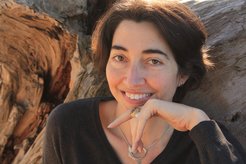Alexandra Worden appointed Max Planck Fellow

Professor Worden is best known for her highly interdisciplinary research investigating interactions of marine microbes and their role in taking up CO2. Among her most significant achievements are her studies of photosynthetic picoeukaryotes, which are tiny cells found throughout sunlit ocean waters. Aided by new technologies and ocean-based experiments, Worden has delivered new understanding of the physiology, ecology and role of picoeukaryotes in global sequestration of carbon.
Researching marine microbes
Professor Worden has researched numerous marine algae and more infamous marine microorganisms, like Vibrio cholerae, that bacterium that causes Cholera disease. Her lab also focuses on the fate of microbes in the wild – including viruses that infect algae and other single celled organisms, leading to the discovery of giant viruses that infect the closest living unicellular relatives of animals, marine choanoflagellates. Her research integrating across genomics, evolution and field biology, has contributed greatly to our knowledge of photosynthetic CO2 uptake in the ocean, the interactions between unicellular marine organisms and their biological consequences.
New research impulses
Professor Worden comes from the USA and did her doctorate at the University of Georgia’s Odum School of Ecology. She led an ocean innovations research team at the Monterey Bay Aquarium Research Institute in California for over a decade, before moving to Kiel. "Alex is a wonderful researcher," says Paul Rainey, Director at the Max Planck Institute for Evolutionary Biology. "We are sure that work at the Institute will benefit greatly from her energy and insights." The status as Max Planck Fellow comes with annual funding of €100,000 for personnel, junior staff and material resources and is initially valid for a term of five years.
